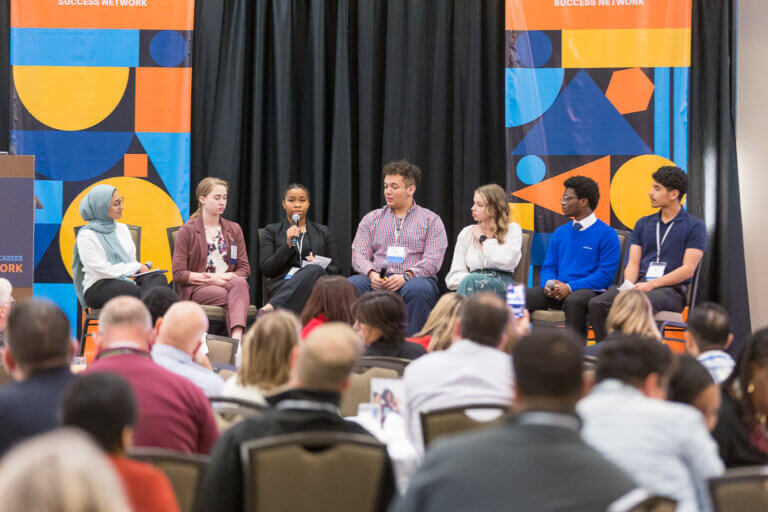What if students could earn meaningful credentials in math by demonstrating what they know and are able to do, not just by what they score on a test?
The Illinois Math Badging Initiative (IMBI) has explored that possibility. Launched by EdSystems in 2022 with support from the XQ Institute, this initiative set out to rethink how high school students can demonstrate mastery of math skills through badges earned across multiple learning experiences, including coursework, independent study, and even work-based learning.
During the 2024–25 school year, Charleston High School and Ridgewood High School piloted math badges in their Geometry in Construction and transitional math courses, respectively. These badges blended rigorous academic standards, performance-based assessments, and opportunities for student agency within a competency-based learning framework that focused on real-world applications and postsecondary readiness. By integrating math badging into existing courses, Charleston and Ridgewood aim to create a more authentic and personalized learning experience that prioritizes mastery, builds student confidence in math, and helps students make meaningful connections between math and the world around them.
Key takeaways from the pilot, including what worked, what proved challenging, and how schools can build on this model to bring student-centered math learning to life, are highlighted below.
Math Badging in Practice
Charleston High School uses badges to validate the learning that occurs in its Geometry in Construction course, ensuring students master rigorous math content while engaging in construction applications. The math teacher for this course, who is also the lead of the math department, leveraged the IMBI pilot as a catalyst for the school’s broader transition to becoming a fully competency-based education institution. The teacher played a central role by drafting learning targets that are tightly aligned with badge language, helping the math department revise its proficiency scales to reflect clear, concise expectations for student mastery. Charleston plans to deepen this integration in the coming year by integrating math badging in their transitional math and introductory algebra courses.
Ridgewood High School is an established competency-based education school and chose to integrate math badges into its transitional math courses, using the initiative to support performance-based and project-based learning. The teacher utilized digital platforms such as Canvas, Notability, and Google Drive to enable students to submit their portfolio evidence electronically, often through photos or screenshots of written or digital tasks. While a broader curriculum shift has placed a temporary pause on full-scale implementation, the school remains committed to embedding the badging approach into its transitional math program in school year 2025–26.
What We Learned
The pilot uncovered several key takeaways that are relevant to any school looking to make math more meaningful and student-centered:
More Complex Instruction Leads to More Collaboration
Teachers reported a major shift from engaging in procedural tasks to conceptually rich, collaborative problem-solving. Students worked together using complex instruction models, and many began reflecting on their learning in ways teachers hadn’t seen before. Badges also provided both teachers and students with a shared roadmap of learning goals and progress toward mastery for each unit.
Portfolios Encourage Ownership and Growth
Instead of one-and-done tests, students’ curated portfolios of their work demonstrate growth over time. Built-in reflection components prompt them to explain their thinking, and teachers noted an increase in classroom dialogue about math concepts. Feedback shifted from focusing on final grades to emphasizing revision and progress.
High-Quality Professional Development Is the Most Valuable Resource
Teachers found the badge-specific professional development provided by Student Achievement Partners to be highly impactful, offering practical tools and insights that directly informed their implementation strategies and deepened their understanding of the badging process. Teachers utilized these resources and regularly attended community of practice convenings hosted by EdSystems to refine their teaching practices and learn from one another.
Challenges
Implementing a new instructional framework, such as math badging, is never without hurdles. The pilot sites encountered a few key challenges, which, although difficult, provided critical insights into what supports are necessary for success and sustainability. Some of the biggest challenges included:
- Curriculum alignment: Teachers have to thoughtfully integrate badge tasks without overwhelming existing pacing.
- Portfolio management: Both students and teachers require time and support to learn how to curate evidence and provide effective feedback.
- Scaling with support: It’s not enough to have one or two teachers piloting the model. Sustained collaboration, leadership buy-in, and shared tools are necessary for broader adoption.
- Mindset shifts: Expanding math badging involves a cultural and mindset shift in how teachers, students, and administrators approach learning, assessment, and grading. Success depends on consistent dialogue, reflective practice, and leadership that models and supports these evolving practices.
What’s Next
The Illinois Math Badging Initiative represents more than just a new assessment tool; it marks a shift in how we think about math learning, postsecondary readiness, and equity. By giving students the opportunity to show what they know in authentic, personalized ways, Charleston and Ridgewood are helping to reimagine what’s possible in high school math.
With continued investment, shared leadership, and a commitment to growth, math badging can become a powerful tool in our collective effort to prepare every student for what comes next.


